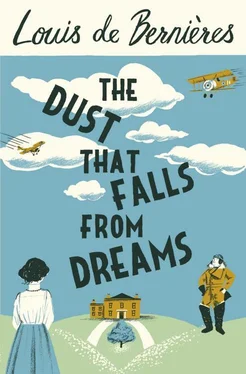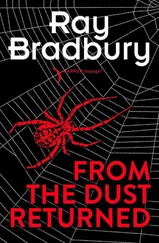‘You smell just like a puppy,’ said Gaskell, putting her arm over Christabel, and tucking up.
AFTER A FEW weeks had passed, the AC Six was still in the driveway, and Mr and Mrs McCosh were beginning to find it a nuisance.
‘Why doesn’t that fellow come and get the damned thing?’ Mr McCosh demanded frequently.
‘In case Daniel’s here and gives him another thrashing,’ said Ottilie. ‘I wouldn’t come back if I were him.’
‘He’s probably too ashamed,’ said Rosie. ‘I would be.’
‘He might be in prison,’ said Christabel. ‘He’s a murderer, if you think about it.’
‘A manslaughterer, at the very least,’ said Mr McCosh. ‘I hope he’s sewing up mailbags for many years to come. But what are we going to do about the damned AC? The hackney carriages can’t get round the crescent and have to drop us off outside in the road.’
‘It is too humiliating to be dropped outside in the road,’ said Mrs McCosh. ‘Just imagine if Their Majesties were to come by, and had to be dropped in the road. It would be too mortifying.’
‘Or the Shah of Persia,’ said Ottilie.
‘Indeed,’ concurred Mrs McCosh.
‘Or the Maharaja of Morvi,’ said Christabel.
‘Or the Grand Panjandrum of Mysorebaksyde,’ said Mr McCosh.
‘Thank you, that’s quite enough,’ said Mrs McCosh. ‘What does one have to do to be taken seriously? What are we going to do about the horseless carriage?’
‘One of us should go to the police station and try to find out what’s going on,’ suggested Rosie. ‘We can ask the police to sort it out.’
‘Your idea,’ said Ottilie. ‘You do it.’
‘I’ll do it if you come with me,’ said Rosie.
The two sisters walked to the police station and found a sergeant at the desk, who was not at all interested. ‘Once it’s been there for ten years, I think I’m right in saying that it’s yours,’ he said, ‘but I might have made it up. Better ask a lawyer.’
‘Can’t you give us the man’s name and address?’ asked Rosie. ‘Or ask someone from the station nearest to his house to go and see him and ask him to dispose of it?’
‘I’ll see what I can do, miss’ said the policeman wearily. As the British police, then as now, measure out their lives by the intervals between cups of tea, he resolved to deal with the matter at a quarter past eleven.
Thus it was that one week later Constable Dusty Miller arrived at the house and presented Rosie with a handwritten message stating that the gentleman concerned had jumped bail and apparently absconded abroad in a Vickers Vimy. Furthermore, he had been fined £600 during the war for hoarding. ‘He was an all-round nasty piece of work,’ concluded the constable.
‘Gracious me, what shall we do with the car, then?’ asked Rosie.
‘If I were you, I’d just use it, miss. I don’t think ’e’s coming back. ’E’s probably sipping gin in Rangoon. I’d get it insured, though.’
‘Hmm,’ said Rosie doubtfully. ‘Oh well, thank you so much, Constable, and do call in at the kitchen. I’m sure Cookie will give you a cup of tea.’
‘Thank you very much, miss, that’s very kind, miss.’ This was something he had been intending to do anyway, but it was certainly congenial to have permission. ‘How are you getting on with the cat, miss?’
‘He’s always climbing the curtains. It drives my mother mad. Then he reverses down with great difficulty. He’s growing terribly quickly.’
‘Ah, a curtain climber. Fluff mostly stops us writing our reports. She likes to sit on the paper and play with the pens. She knocked over a pot of ink last week. And she turned over the milk jug.’
‘We were going to find a home for Caractacus,’ said Rosie, ‘but I don’t think we will.’
‘Well, that’s the trouble with cats, miss,’ said the constable wisely.
OUT BY THE side of the house, on a freezing day, the Reverend Captain Fairhead, dressed in his officer’s warm, was watching with interest as two dozen bags of coal were borne from Freemantle’s large cart by four men who were themselves as black as the coal that they carried, as were the enormous dray horses which stamped and snorted in the shafts, their breath hanging like plumes of smoke in the frozen air. The coal dust had been worn and compressed into the coalmen’s leather aprons and jerkins, their caps, the felt of their donkey jackets, and into the skin of their hands and faces. Shining and gleaming, the coalmen were like creatures from another universe. Not for the first time, Fairhead felt a kind of gratitude that he had been born to a lighter fate.
He bowed his head for a second, though, when he remembered how backbreaking it had been to be at one end of a stretcher, struggling through mire, or attempting to carry a wounded man over one’s shoulders. ‘I have something in common with them after all,’ he thought. Fairhead remembered how intense physical labour can keep you more than warm on an icy day. He saw how much they enjoyed tipping the coal down the chute into the cellar. They always stood for a second and watched it go. It went down with a wonderful rumble on the wooden boards, and arrived at the bottom with a satisfying soft crash. He wondered what kind of life the coalmen could have at home. Perhaps they left their clothes at the door, stepped naked into their houses, and stood in a tub while their wives went back and forth with jugs of hot water. Perhaps they spent their evenings and Sundays as white as the lamb.
Fairhead became aware of someone standing beside him, and he turned his head. ‘I love it when the coal comes,’ said Rosie. ‘When you’re inside the house you don’t expect it, and when it starts, my first thought is “Oh no, it’s an earthquake!”’
‘I was thinking about the lives of these people, these coalmen,’ said Fairhead. ‘I was trying to imagine it.’
‘I often look at people with what seem to be intolerable lives, and then I can’t help but notice that they’re really quite happy. Just as happy as us, anyway.’
‘Are you happy, Rosie? I can’t help noticing that you and Daniel have become constant companions. Moving pictures, skating, art exhibitions, smoking concerts, dancing … Do we have grounds for hope?’
‘Hope?’
‘Come, Rosie, I’m sure you catch my drift.’
‘Well, I wanted to ask you about it. I want your opinion. As a man of God. Shall we go inside? It’s perishing.’
They gave up their coats to Millicent, and sat either side of the drawing-room fire, shivering now that they were warming up a little.
Rosie said, ‘I won’t beat about the bush. The thing is … Daniel has asked me to marry him. Several times. He is very insistent.’
‘I take it from what you say that you haven’t accepted him?’
‘No. Not … I’m very doubtful. I’m in two minds. It’s not like you and Sophie …’
‘But you do get on terribly well. Let’s come straight to the point, shall we? Do you love him enough to marry him?’
Rosie hung her head. ‘This is what I don’t know.’
Fairhead leaned forward, pressing his fingertips together. ‘Look, Rosie, I don’t have any experience to speak of. But one thing I do suspect is that you should not marry someone if you are not dedicated to their happiness rather than your own. Are you willing to dedicate yourself to his happiness? And are you sure that he will be more interested in your happiness than in his own?’
‘I’m certain he would be a good husband,’ said Rosie sincerely, ‘and that’s what makes it so tempting. But I do know myself. I might very well say that I will always put his happiness before mine, but will I, when it comes down to it? I don’t trust myself, the way I would have done with Ash.’
Читать дальше












